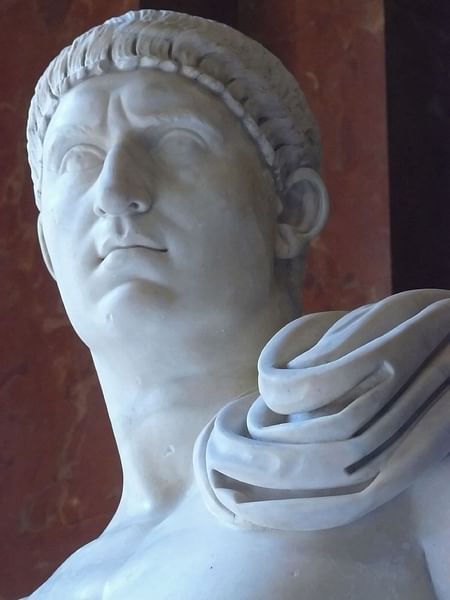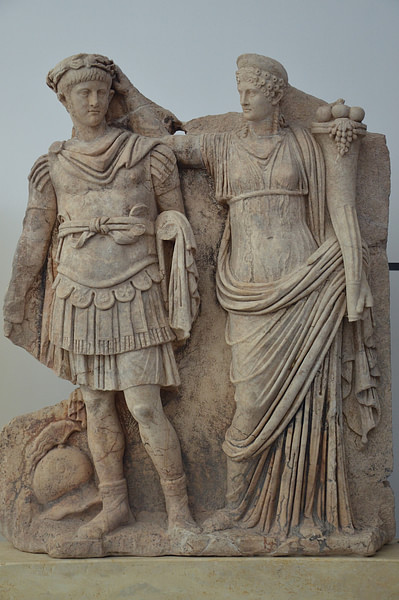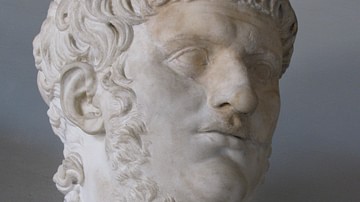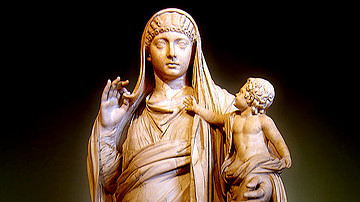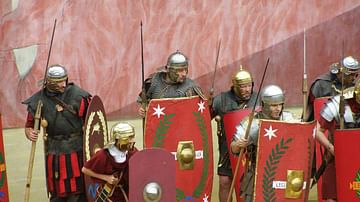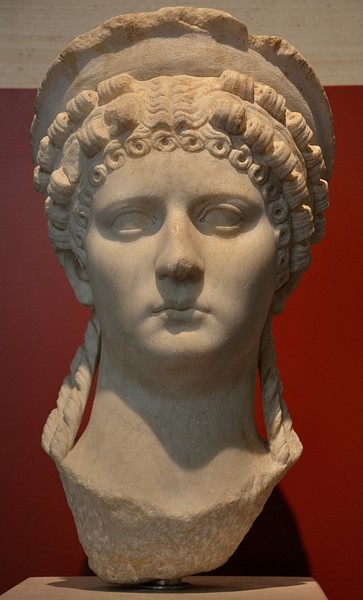
Poppaea Sabina (30-65 CE) was the wife of Praetorian prefect Rufrius Crispinius and then Marcus Salvius Otho (r. 69 CE) before she became the second wife of Roman emperor Nero (r. 54-68 CE). Considered by ancient sources both attractive and intelligent, she used her beauty and charm, to persuade Nero to divorce Octavia, the daughter of Claudius (r. 41-54 CE) and Valeria Messalina, and marry her.
Family
In his book Ten Caesars historian Barry Strauss wrote that Poppaea was "a woman fit for a king. She was wealthy, intelligent and ambitious" (91). She was born in 30 CE in Pompeii; her father was Titus Ollius, who was executed as a supporter of the treasonous Lucius Sejanus in 31 CE. Her maternal grandfather was Gaius Poppaeus Sabinus, a prominent consul and provincial governor who had fought against the Thracians. Tacitus wrote that he was "a man of illustrious memory and prominently distinguished by the honours of a consulship and a triumph" (Complete Works, 312). Possibly due to the shame of her father, Poppaea changed her name to her grandfather's.
In 47 CE, the empress Messalina forced Poppaea's mother, Poppaea Sabina the Elder, to commit suicide. From her mother, Poppaea the Younger inherited property and a brick factory in Pompeii. She used the beauty she also inherited from her mother to her advantage. While those around her saw her as both clever and a pleasant conversationalist, Tacitus viewed her as "immoral and venal" (312) and maintained that she was indifferent to her reputation, writing that "Advantage dictated the bestowal of her favours" (306). "… she was never a slave to her own passion or to that of a lover. Whenever there was a prospect of advantage, there she transferred her favours." (312)
In 44 BCE, she was married to a Praetorian prefect, Rufrius Crispinius, with whom she had a son. After Poppaea's death, Nero would have the young boy's slaves drown him while on a fishing trip.
Marriage to Otho
While married to Rufrius, she was drawn to the fashionable elegance of the 26-year-old and politically inexperienced Otho (l. 32-69 CE). The fact that he was a close friend and confidant of Nero may have attracted her attention. Divorcing her husband, she married Otho. There are conflicting accounts concerning this second marriage, but most historians agree that the marriage was a fraud. The accepted version states that the only way Nero could have her for his mistress was for her to marry Otho. This marriage would dispel the concerns of Nero's mother, Agrippina the Younger (15-59 CE), regarding her son's relationship with Poppaea. However, Otho fell in love with Poppaea, and to Nero's chagrin, he would often brag about the beauty and graces of his wife – this bravado would have dire consequences for the unsuspecting Otho, who would be exiled to Lusitania in 59 CE, thereby allowing Poppaea to become Nero's mistress without interference.
The historian Suetonius (69-130/140 CE) wrote of Otho and Poppaea's marriage in his The Twelve Caesars. According to his version of the events, Nero asked Otho to be Poppaea's "protector." She "had been taken by Nero from her husband to be his mistress – and they [Otho and Poppaea] went through a farce of marriage together." But Otho held such a "deep passion for her that he would not tolerate even Nero as a rival." Otho rebuffed messengers sent to "fetch Poppaea." Even Nero was left "threatening and pleading for his rights to his lady" (256). As punishment, the marriage was dissolved and Otho was shipped off to Lusitania (at the suggestion of Seneca), where he governed "with moderation and restraint" (ibid). Later, he would have his revenge through his support of Galba (r. 68-69 CE) in the overthrow and suicide of Nero in 68 CE. Suetonius wrote that only the fear of a scandal kept Nero from doing more than shipping Otho to Lusitania.
According to Tacitus' account, while married to her first husband, Poppaea was seduced by Otho. He would often praise Poppaea's charm and grace before Nero. After having dinner with the emperor, Otho bragged that he was going to his wife "who had brought him what all men want … nobility and beauty" (Annals, 307). Tacitus wondered if this boasting was an indiscretion or a deliberate attempt to enhance his own political power. As Nero became more infatuated, Poppaea became snooty, stating she was married and could not give up her marriage. She was devoted to Otho – to his character and way of living. She dismissed Nero who she believed was "kept down because the mistress you live with [Acte] is a servant" (ibid). To eliminate Otho's rivalry, he was made governor of Lusitania.
Marriage to Nero
Before Nero could marry Poppaea, he had to overcome two major obstacles: the first was his mother, Agrippina, who saw every woman as a threat to her power and opposed any relationship with Poppaea. Next was Nero's wife. Agrippina wanted to ensure her son's right to inherit the throne by having him marry Octavia, the only daughter of Emperor Claudius and Valeria Messalina in 53 CE, but the arranged marriage was never a happy one.
In his book Nero, historian Anthony Everitt wrote that at some point, for reasons unknown, Nero decided to kill his mother. Some argue that he no longer wanted to share power. Many believe, however, that the immediate impetus for killing Agrippina was Poppaea, who eagerly wanted to marry Nero, but to her dismay, the emperor did not consider there to be a rush to marry. Poppaea saw Agrippina as the enemy. Tacitus wrote, "While Agrippina lived, Poppaea saw no hope of his divorcing Octavia and marrying her, so she nagged and mocked him incessantly." She asked, "I suppose my looks and victorious ancestors are not good enough" (312). After a number of failed attempts, in 59 CE, Agrippina was murdered. Her death would haunt Nero for the remainder of his life.
One obstacle had been eliminated, but there was one more: Octavia. She was still quite young and had little interest in politics. She was the daughter of an emperor, a member of the imperial family, and highly respected and loved by the Roman people, and so a divorce would take careful planning. An opportunity soon presented itself. After a brief illness, Nero realized he had to produce an heir, and time was something he did not have because Poppaea was pregnant. Claiming Octavia was barren, Nero divorced her and married Poppaea twelve days later, but the new bride would not feel secure until Octavia was eliminated. Poppaea had a member of Octavia's household accuse her of adultery – an affair with a slave, an Alexandrian flute player, named Eucaeus. Tacitus wrote: "The woman who had long been Nero's mistress and ruled him first as a paramour then as her husband instigated an intrigue with a slave." (Complete Works, 353)
The emperor's ex-wife was banished to Campania. Although there were detractors, most people remained loyal, maintaining her innocence. "This led to incessant and outspoken remonstrances among the common people …" (353) Nero relented, but his wife continued to nag him. Rumors soon returned. Some even claimed he was going to remarry Octavia. Crowds overturned statues of Poppaea and returned those of Octavia to the Roman Forum and temples. Poppaea feared that the violence of the crowd would burst upon her and her life was in jeopardy. Nero was both frightened and angry. Returning to the charge of adultery, he decided someone had to be found who would admit to having an affair with Octavia. An admiral of the Misenum fleet, Anicetus, was chosen; he made a complete confession. "Before the council, he invented even more than what was required of him and confessed before friends whom the prince had called in as a sort of judicial council." (355)
His reward for his lies was being sent to Sardinia. Octavia was banished to Pandateria in the Bay of Naples; however, orders arrived for her execution. She was bound in chains, and her veins were opened, but the blood flowed too slowly, and she was finally suffocated by the steam of a hot bath. Her head was cut off and sent to Rome, where it was shown to Poppaea.

Death of Poppaea
In 65 CE, one year after the Great Fire, Poppaea Sabina died. Nero was devastated. Rumors circulated at the time about the cause, and ancient historians agree that it was the emperor's fault. One night she began nagging him after he came home late; he had been at the races. Losing his temper, he kicked the pregnant Poppaea in the stomach. She died as the result of a miscarriage. Supposedly, according to the poets, the goddess Venus arrived at the Palatine and bore her away in a chariot to the heavens and her place above the northern pole.
Holland wrote that the most celebrated woman in Rome became a god – "a sumptuous funeral was staged to mark her ascension to the heavens." (Holland, 25) Choruses sang hymns and senators gathered at the Forum. Unlike others of the imperial family who were cremated, Poppaea, "stuffed with spices", had been mummified – the city had seen enough of fires. After Nero's eulogy, the funeral procession left the Forum, passed through the city gates, crossed the Campus Martius, and entered the Mausoleum of Augustus where a chamber awaited her. Although the Roman Senate voted to give her divine honors, Everitt wrote that she was not greatly missed by the political elite. The mourning Nero married Statilia Messalina one year later after forcing her husband to commit suicide on a conspiracy charge.

